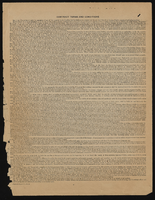Search the Special Collections and Archives Portal
Search Results

Christina Gruber oral history interview: transcript
Date
Archival Collection
Description
Oral history interview with Christina Gruber conducted by Barbara Tabach on March 2, 2019 for the Remembering 1 October Oral History Project. In this interview, Gruber shares her experience living in Las Vegas, Nevada since 1997 and as a Certified Public Accountant (CPA), mother of two, and physical fitness enthusiast. She recalls being shot during the Route 91 Harvest Festival and being rescued by strangers. She recalls the chaos of the evening, but also how strangers worked together to comfort each other amidst the terror. She discusses dedicated her athletic races to those who were murdered that evening, and how it has helped her recovery.
Text

Cherina Kleven oral history interview: transcript
Date
Archival Collection
Description
Oral history interview with Cherina Kleven conducted by Cecilia Winchell on June 9, 2021 for Reflections: The Las Vegas Asian American and Pacific Islander Oral History Project. Cherina Kleven talks about her family and childhood growing up in Taiwan amongst six siblings. She shares her family's history and how they immigrated to Las Vegas while she was a teen, as well as her employment history and how she met her husband. Cherina talks about racial and gender discrimination and the obstacles she has overcome to be the only working female in her family, the only woman firefighter at her station house, and the first female Asian American Assistant Fire Chief in the United States.
Text

Marisa Rodriguez oral history interview: transcript
Date
Archival Collection
Description
Oral history interview with Marisa Rodriguez conducted by Maribel Estrada Calderón, Monserrath Hernández and Claytee D. White for the Latinx Voices of Southern Nevada Oral History Project. Marisa Rodriguez discusses her childhood and living in North Las Vegas as a teenager; she was born in Chicago, Illinois, moved to Mexico with her family at a young age, and returned to the United States at age 12. She recounts what it was like acclimating to American life, learning English, and studying abroad in Spain before becoming a law student. Marisa attended the William S. Boyd School of Law and is currently a civil litigator in Las Vegas. Subjects discussed include: La Voz Hispanic/Latino Law Students Association at the William S. Boyd School of Law; Huellas mentorship program.
Text

Olivia Meneses oral history interview: transcript
Date
Archival Collection
Description
Oral history interview with Olivia Meneses conducted by Elsa Lopez and Barbara Tabach on September 18, 2019 for the Latinx Voices of Southern Nevada Oral History Project. Olivia Meneses describes growing up in Mexico City and attending la Universidad Iberoamericana during the 1968 student movement that culminated in the Tlatelolco massacre. She discusses migrating to the United States in 1983 and moving to Las Vegas in 1985, where she began teaching Spanish to kindergarten students.
Text
Marilyn Kirkpatrick (Clark County Commisioner) oral history interview conducted by Magdalena Martinez: transcript
Date
Archival Collection
Description
From the Lincy Institute "Perspectives from the COVID-19 Pandemic" Oral History Project (MS-01178) -- Elected official interviews file.
Text

"A Dream Fulfilled" speech by Roosevelt Fitzgerald
Date
Archival Collection
Description
From the Roosevelt Fitzgerald Professional Papers (MS-01082) -- Unpublished manuscripts file. Speech for 112th Founders Day celebration of Jackson State University.
Text

Transcript of interview with Willie Jones, James Jones, and Jamet Jones by Robbin Mc Laurin, March 5, 1980
Date
Archival Collection
Description
On March 5, 1980, collector Robbin McLaurin interviews three members of the Jones family, Willie, James, and Jamet Jones (born 1923, 1920, and 1961, respectively) in the Jones home. Mr. and Mrs. Jones were born in Forest, Mississippi, and relocated to Las Vegas, Nevada, for employment related purposes. This interview covers Las Vegas, past and present.
Text

Transcript of interview with Gertrude Rudiak by Claytee White, January 11, 2007
Date
Archival Collection
Description
Gertrude (n?e Rightman) Rudiak was born in 1915 in North Dakota to Russian immigrants. She grew up in Wisconsin until 1924. That was the year the family drove to California via the Yellowstone Trail, a dusty, undeveloped road marked by yellow stones. In Los Angeles, her father practiced chiropractic, a holistic approach to well-being for which there was little knowledge at the time. Gertrude earned her music degree at University of California at Berkeley; a decision that did not lead to a career. She then attended a business college and got a job as a social worker in Northern California. In 1941, she met and soon married George Rudiak. It was the advent of World War II. George enlisted in the service and was assigned to Las Vegas Gunnery School (Nellis Air Force Base.) Since he had a law degree from University of California at Berkeley and passed the Nevada Bar exam, he found supplemental employment with local attorneys. Las Vegas became the Rudiaks? permanent home where they raised their five children. In this interview Gertrude recalls the stories of coming to live in Las Vegas of the 1940?s: their phone number was 1-2-3; the neighborhood they lived in longest being Scotch 80s and being part of the secular and Jewish communities.
Text


